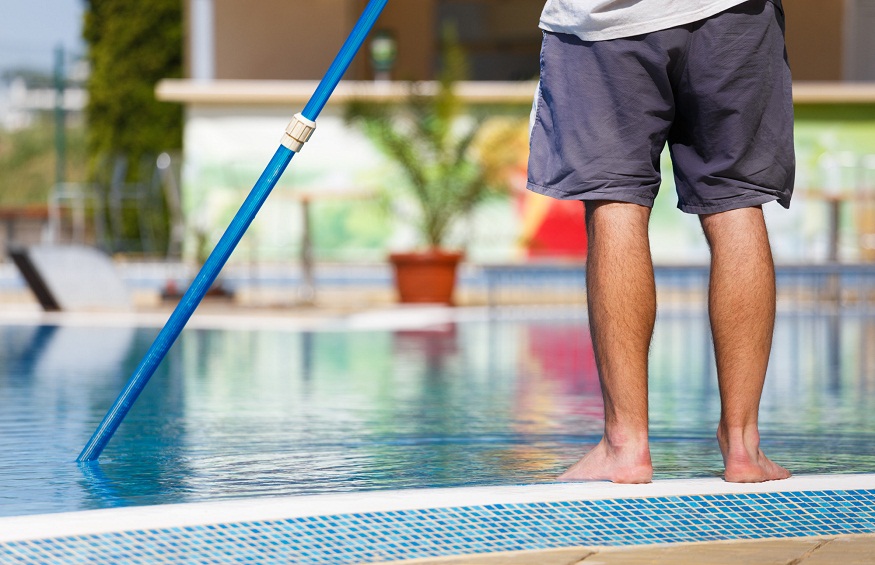A small pool may be profitable and fun to maintain, but it takes constant work and close attention to detail. Maintaining top-notch conditions is essential to maintaining your pool hygienic, secure, and welcoming—whether you own a pool already or are wanting to improve your existing maintenance regimen. They will go over the best pool maintenance for small pool care in this extensive guide, which covers everything from chemical balancing and cleaning to typical problem-solving.
Knowing the Fundamentals of Maintaining a Small Pool
Before getting into the details, it’s critical to comprehend the foundational elements of tiny pool upkeep. This covers chemical balance, water circulation, appropriate filtration, and routine cleaning. Ignoring any one of these factors can result in equipment damage, algal growth, and problems with water quality.
Small Pool Cleaning
Proper pool upkeep starts with routine cleaning. Day by day, or leading up to the most hectic that the seasons take, the skimming of the surface should be done to clear out the insects, leaves, and other debris. The slope’s walls and floor are also thoroughly vacuumed once a week to aid in removing algae and other sinkable debris.
Keeping Water Chemistry at Its Ideal Level
An important element of pool maintenance is to keep the water chemistry under control, as it is necessary to provide a secure and calm environment in which you and your guests can swim. Such analysis includes regularly checking the water’s alkalinity, calcium hardness, pH indicator, and chlorine content. By modifying these settings as necessary, bacterial development, skin irritation, and equipment corrosion can be avoided. Accurate findings may only be obtained by using high-quality testing kits and according to manufacturer instructions.
Surfacturing and Distribution
An important element of pool maintenance is to keep the water chemistry under control, as it is necessary to provide a secure and calm environment in which you and your guests can swim. Such analysis includes regularly checking the water’s alkalinity, calcium hardness, pH indicator, and chlorine content. Furthermore, making sure the pool pump runs for a certain amount of hours every day guarantees that the water is filtered and circulated efficiently. To save running expenses while maximising performance, think about investing in energy-efficient pumps and filters.
Temporary Upkeep Assignments
The needs for pool care vary with the seasons. After months of inactivity, it’s imperative to remove winter coverings in the spring, give the pool a thorough cleaning, and adjust the water’s chemistry. Summertime brings more sunshine and swimmers, making routine chemical level monitoring and adjustment even more important. To minimise freezing damage, the pool must be prepared for winterization in the fall by reducing the water level, emptying the equipment, and applying winterizing chemicals.
Resolving Typical Problems
Even with careful upkeep, tiny pools can occasionally have issues that need to be fixed. The most frequent problems that pool owners deal with include algae blooms, murky water, and broken equipment. Preventing more harm and restoring water quality need an understanding of the underlying causes of these issues and swift remedial action.
A Guide to Preventive Maintenance
Preventive maintenance procedures, together with routine cleaning and chemical balancing, may help your small pool’s equipment last longer. Being oil tightness and damage a big problem is the checking and oiling of gaskets, seals, and o-rings. Seeing to it that the heaters, filters, and pumps are well maintained is like skipping your way out of major inconveniences. With a nice durable skimming pool cover you could decrease evaporation and at the time when your pool isn’t in use, you could protect it from dirt.
Sophisticated Maintenance Methods
Apart from the basic elements of small pool upkeep, there exist sophisticated methods and approaches that may also augment the hygienic and functional components of your pool.
Sanitization using UV and Ozone: UV or ozone systems added to conventional chlorine-based sanitising can offer an extra line of defence against germs, viruses, and algae. These innovations enhance the purity and quality of water while lessening the need for harsh chemicals.
Chlorination of Salt water: Salt chlorinators are designed to allow the exchange of dissolved salt, and thereby make swimming pools chlorine-free without the necessity of weekly human chlorine additions. This can result in water that is softer on the skin and eyes without trading off the sanitising ability. Using this technology can enable a better quality of life for current consumers and attract additional ones.
Technology for Smart Pools: By utilising smart pool technology, you may remotely monitor and manage the functions of your pool. These systems provide pool owners more convenience and peace of mind by allowing them to modify pump speeds, schedule filtration, and get warnings for imbalances in the water’s chemical composition.
Conventional Expert Upkeep: While doing your maintenance is important, hiring a professional pool technician regularly will help you see possible problems early on and make sure your pool equipment is working at its best. Deep cleaning, equipment inspections, and preventive maintenance activities that are outside the purview of routine home upkeep are examples of professional services.
Recall that maintaining equipment performance and water purity requires frequent monitoring and modification. Don’t undervalue the significance of managing and storing pool chemicals correctly to guarantee their efficacy and safety. Additionally, keeping up with local laws and recommended pool care procedures will help you avoid problems on the road and remain compliant. You may have a small pool that looks great and serves as a safe and pleasant haven for you and your loved ones to enjoy throughout the swimming season and beyond by being proactive and taking care of maintenance responsibilities as soon as they arise.
Conclusion:
It takes a mix of expertise, commitment, and financial investment in the appropriate equipment and technology to maintain a small pool maintenance at the highest calibre. You can make your swimming area safe and welcoming for you and your family to enjoy by following recommended cleaning, chemical balancing, and equipment maintenance procedures.
The most important things are to be consistent and pay attention to details, regardless of whether you want to handle maintenance yourself or depend on automated systems and expert services. Your little pool may provide years of delight and relaxation with careful maintenance, giving everyone who swims in it many hours of summer fun and the chance to make lifelong memories.





